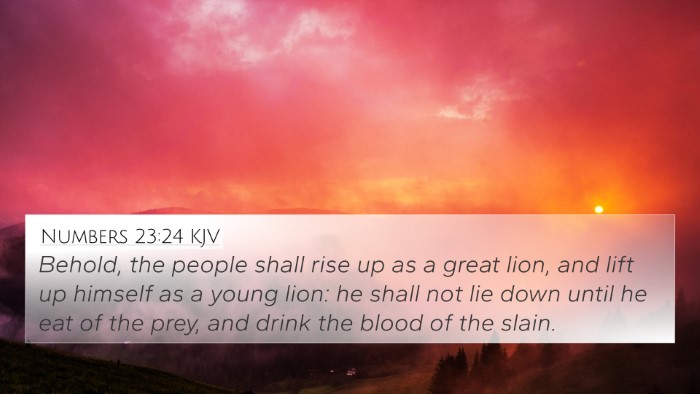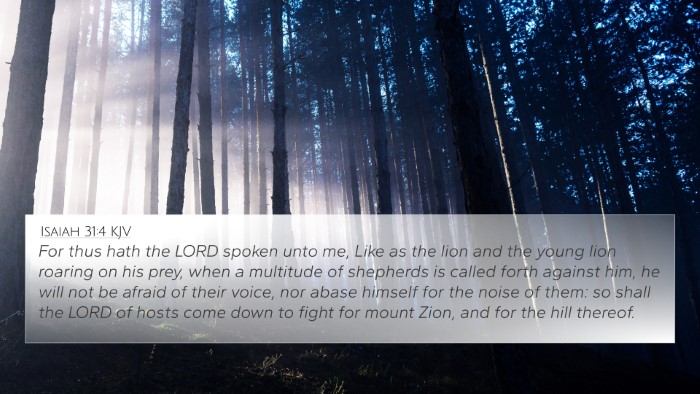Psalms 58:6 Meaning and Interpretation
Psalms 58:6 states, “O God, break the teeth in their mouths; tear out the fangs of the young lions, O Lord!” This verse is a passionate cry from the psalmist, expressing a desire for divine intervention against wickedness.
Context of Psalms 58
The psalm belongs to a category known as "imprecatory psalms," where the author invokes divine judgment against enemies. The psalmist here addresses the injustice of the wicked and calls for God's decisive action against them.
Insights from Public Domain Commentaries
-
Matthew Henry's Commentary explains that the prayer for God to break the teeth of the wicked signifies a plea to render them powerless, much as a lion's fangs make it a fierce predator. Henry emphasizes that without the ability to harm, the wicked are effectively neutralized.
-
Albert Barnes' Notes discuss the metaphorical language used in this verse. The “teeth” symbolize strength and power; thus, the psalmist is asking for divine intervention to weaken the adversaries’ ability to inflict harm.
-
Adam Clarke's Commentary highlights that tearing out the fangs of “young lions” further illustrates the danger posed by the wicked. By targeting the young, Clarke notes, the psalmist emphasizes the urgency of addressing both established and emerging threats to righteousness.
Thematic Connections
This verse reflects broader biblical themes such as justice, divine retribution, and the protection of the innocent. The harsh imagery invokes a sense of urgency in seeking God’s justice. The following are essential thematic connections:
- God as a defender of the oppressed.
- The call for justice against the unjust.
- The power of prayer in seeking divine intervention.
Bible Verse Cross References
Several scriptures resonate with the themes presented in Psalms 58:6. Here are some notable cross-references:
- Psalms 2:9: "You shall break them with a rod of iron; you shall dash them in pieces like a potter's vessel." A call for divine authority to break the oppressive forces.
- Psalms 10:15: "Break the arm of the wicked and evildoer; call his wickedness to account till you find none." This prayer shares the same desire for the nullification of evil.
- Psalms 144:10: "It is he who gives victory to kings, who rescues his servant David from the deadly sword." The assurance of God’s protection against adversaries.
- Proverbs 30:14: "There are those whose teeth are swords, whose fangs are knives, to devour the poor from the earth, the needy from among mankind." This verse illustrates the destructive power of the wicked.
- Isaiah 54:17: "No weapon forged against you will prevail, and you will refute every tongue that accuses you." A promise of protection against adversaries.
- Revelation 19:15: "Out of his mouth comes a sharp sword with which to strike down the nations." Symbolizing God’s ultimate judgment.
- Romans 12:19: "Beloved, never avenge yourselves, but leave it to the wrath of God..." Reinforcing trust in divine justice.
Comparative Bible Verse Analysis
In engaging in comparative Bible verse analysis, one can examine the connections between the imprecations in Psalms and the broader biblical narrative of justice and vindication. This psalm can be compared with other scriptures that invoke God's intervention:
- The connections between Old and New Testament teachings about divine justice.
- The reflective nature of prayer for justice found in the teachings of Jesus.
- Contrasts with the New Testament’s teachings on love and forgiveness, underscoring the multifaceted understanding of divine justice.
Cross-Referencing Biblical Texts
Utilizing cross-referencing Biblical texts can enhance our understanding of the moral and spiritual lessons within this psalm. Below are methods of employing cross-referencing in study:
- Identification of Themes: By locating verses with similar themes, one can draw parallels to enhance understanding.
- Lexical Analysis: Exploring keywords such as "teeth," "fangs," and "break" across different scriptures to discern their significance in varying contexts.
Conclusion
Psalms 58:6 is a poignant reminder of the human longing for justice and the assurance that God hears the cries for help against the wicked. By understanding this text and its connections to other scriptures, we gain deeper insight into God's character as just and powerful.













